|
|
|
Sort Order |
|
|
|
Items / Page
|
|
|
|
|
|
|
| Srl | Item |
| 1 |
ID:
187292
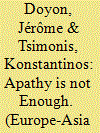

|
|
|
|
|
| Summary/Abstract |
Chinese campuses have been remarkably calm since the post-1989 repression. Yet, the absence of contention masks profound changes in the party-state’s campus management tactics, exemplifying the different approaches authoritarian regimes employ to regiment students. Based on fieldwork before and after Xi Jinping’s rise to power (2012), we analyse the party-state’s move from a ‘corporatist’ to a ‘partification’ strategy on campus. Contrary to the literature that sees apathy and depoliticisation as the goal of the party-state’s management of campuses, we argue that these changes reveal the regime’s apprehension about student alienation from official political channels and constitute an effort to reverse it.
|
|
|
|
|
|
|
|
|
|
|
|
|
|
|
|
| 2 |
ID:
168160


|
|
|
|
|
| Summary/Abstract |
Since Xi Jinping took power in late 2012, analysts have puzzled over how best to define his political trajectory. Is he consolidating power and building a personality cult around himself, or is he strengthen-ing the Party as an organisation? I tackle this issue by focusing on the transformation of personnel policies under Xi. I highlight an increasing concentration of power in the hands of Party leaders at all echelons. At the institutional level, the Party increasingly controls the management and disciplining of officials. At the level of the individual cadres themselves, promotion processes are increasingly managed behind closed doors and less importance is being given to objective criteria for cadre advancement. The age-based rules which structured the promotion of officials and ensured a high level of personnel turn¬over within the party state are also de-emphasised. I argue that these changes are paving the way for a more clientelist and aging party state.
|
|
|
|
|
|
|
|
|
|
|
|
|
|
|
|
| 3 |
ID:
168015
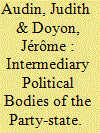

|
|
|
|
|
| Summary/Abstract |
Mass and grassroots organisations are not part of the official political structure of the Chinese Party-state, yet they have been operating as key actors serving the interests of the Party-state while interacting with ordinary citizens in various ways since the early years of the PRC. By studying these organisation’s intermediary status and role in the XXIst century, this special issue of China Perspectives reveals their importance in the political system – as mediators, social service providers, administrative staff – and analyses recent reforms of these organisations under the Xi government.
|
|
|
|
|
|
|
|
|
|
|
|
|
|
|
|
| 4 |
ID:
189218


|
|
|
|
|
| Summary/Abstract |
By tracing the Chinese Communist Party's (CCP) 100 years, this special issue brings to light the organisation's contradictions, setbacks, and changes in direction, together with its long-term evolution. Taking a step back from the current focus on the historical juncture of the twentieth CCP Congress, and on Xi Jinping himself, our long-term approach contextualises recent developments. Looking at the CCP's evolution over time shows how the founding structures and objectives of the CCP have had a long-lasting impact on its future developments as well as how they have been tweaked and rearranged to adapt to the new economic and social environment the party contributed to creating. Our long-term historical approach stresses impermanence beyond the apparent permanence of the party's concepts (e.g. “loyalty” and “democratic centralism”), discursive tactics (e.g. the mobilisation of emotions) and on-the-ground practices (e.g. grassroots party building), while also bringing to light the mere recycling of past practices and strategies.
|
|
|
|
|
|
|
|
|
|
|
|
|
|
|
|
| 5 |
ID:
168019
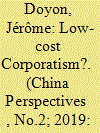

|
|
|
|
|
| Summary/Abstract |
The Communist Youth League has developed a network of sub-organisations to expand its reach at minimum cost. It exemplifies the low-cost corporatism model. Following this model, mass organisations maintain a corporatist relationship with the Party while diversifying their activities through structures they supervise. These structures also provide them with additional material and human resources. In this configuration, the Communist Youth League maintains an equilibrium between dependence on the Party and attractiveness to young people. However, reforms put forward under Xi Jinping challenge this fragile equilibrium by strengthening Party control over the League and its sub-organisations.
|
|
|
|
|
|
|
|
|
|
|
|
|
|
|
|
| 6 |
ID:
189220
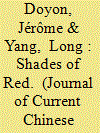

|
|
|
|
|
| Summary/Abstract |
While changes in Chinese Communist Party (CCP) recruitment are generally described as different phases focused on recruiting either “reds” or “experts,” giving more or less weight to political or technical criteria, we instead stress the importance of changing understandings of political loyalty to examine these evolutions. By tracing these changes throughout the party's 100 years, we show that how the party understands loyalty is largely strategic, detached from a purely ideological approach. The CCP has alternatively approached loyalty in ascriptive terms, based on class background, and behavioural ones, looking at active displays of loyalty or passive obedience. The level and form of activism expected from party members and cadres have also dramatically changed over time. Relying on recruitment data, this article shows that it is paradoxically during periods of party expansion that the CCP becomes more politically demanding with its members.
|
|
|
|
|
|
|
|
|
|
|
|
|
|
|
|
| 7 |
ID:
175566
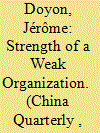

|
|
|
|
|
| Summary/Abstract |
How can a weak organization be a path to power? The Chinese Communist Youth League (CYL) lacks autonomy and coherence yet it is seen as the cradle for one of the main factions within the Chinese Communist Party (CCP). To understand this tension, I provide a novel account of the role played by the CYL in the recruitment of leading cadres since the 1980s. Against explanations based on factional struggles, I argue that the rise of CYL-affiliated cadres is a by-product of the organization's weakness. As the Party appoints CYL heads, CCP leaders, at various levels and at different points in time, have used the League to accelerate the promotion of their protégés. For years, there has been little incentive for Party bosses to dismantle this promotion path. However, in his bid to consolidate his power, Xi Jinping has weakened this channel so that it may not be used by potential rivals.
|
|
|
|
|
|
|
|
|
|
|
|
|
|
|
|
|
|
|
|
|